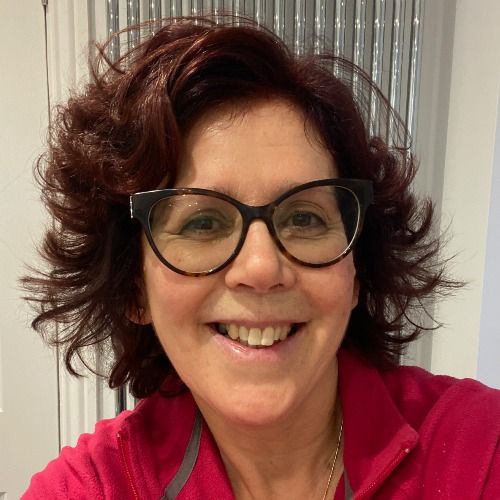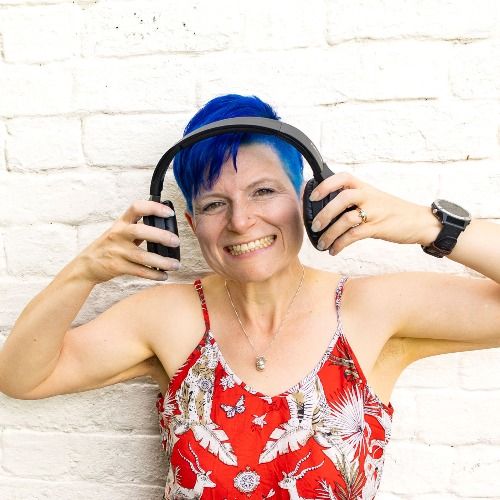Introducing Josephine Hughes
Please Note:
Everybody mentioned in this podcast series has agreed for their story to be told.
We are keeping the names of Josephine's children private.
Josephine is the mum of two transgender young adults.
Her daughters came out at the ages of 16 and 21.
And as the title of this podcast suggests she was 100% Gloriously Unready.
In this episode you'll hear more about Josephine and the expectations she had as a new wife and young mum in the late 1980s and early 1990s.
Has a young person in your life just come out as transgender or non-binary? Do you feel confused and have a lot of questions?
Perhaps you’re feeling frightened for them? Or maybe you’re feeling upset?
Download Josephine's guide for parents Help! My Child Is Trans at GloriouslyUnready.com/transgender
The information contained in Gloriously Unready is provided for information purposes only.
The contents of this podcast are not intended to amount to advice and you should not rely on any of the contents of this podcast.
Professional advice should be obtained before taking or refraining from taking any action as a result of the contents of this podcast.
Josephine Hughes disclaims all liability and responsibility arising from any reliance placed on any of the contents of this podcast.
Transcript
Josephine Hughes
Hi, welcome to the Gloriously Unready podcast, all about being unready for anything.
I'm Josephine Hughes, and this series is about becoming the mum of transgender children. Everyone's agreed to me sharing my story, but I'm mentioning no names, and sometimes I use clumsy language - please bear with me, I'm still learning, I don't mean any harm by it.
I always remember talking to a father-to-be during the course of my work and asking him, ‘what are you looking forward to about the arrival of your baby?’ and he said to me, ‘I'm looking forward to having a child where I can shape them, and make them into the person I want them to be’. And I stood there and thought, I think he's got a lot to learn, because the discovery that I made, and that I describe in this episode, is that we think our children are going to be a certain way, but they are very much themselves.
We got married in the late 80s so that makes us sound so ancient now! We were quite young, when we got married, we were in our mid-20s and we went through the recession that was in the early 90s, and that meant that we could buy our first house, we could actually afford it because house prices went down. And then we lived in Surrey, and that's where I had my first child. And in fact - well in fact, I had all my three children when we were living in Surrey, and it was pretty busy because my three children were born really quite close together. So I had three boys, and they were born within five years of each other.
So I went from working as a librarian, going into London, and spending all my time with adults, to being surrounded by complete chaos, and life with three very small children, which was quite interesting shall we say, and quite a big adjustment for me, and it wasn't really what I expected it to be, which is pretty much the story of my life - things not being quite as I expected them to be.
So when I had my oldest child, who was a boy, I expected my son to be just like my husband, as in interested in boys things, and I particularly, I just had this image that, you know, my kids were boys, and so therefore we’d do a lot of boy stuff - and to me, boy stuff meant being outside and kicking balls around and just genuinely being into football and sport. And none of my children are in the slightest bit interested, I think, in any type of sport, at all.
But I mean, really, when I think about it, I'm not particularly interested in sport either, so why I expected them to be interested in sport, I don't know, but you have all these expectations about what your children are going to be like and what they'll be interested in. And in many ways they were, and still are, quite like my husband. I don't think we'll ever entirely get rid of all our Lego, for example. Fortunately we've moved house, so I'm not still treading on it, but we've still got at least 16 crates of Lego in our loft, and one day, when we've retired, I'm going to get my husband to build all those models. We've still got all the instructions, and I'm going to make a fortune selling them on eBay! That's the plan! That's what my retirement income is going to be - it's building models!
So my children were never really what I expected them to be and the poor little things, you know, I tried to put them in this mould and I caused myself so much anxiety. Like, for example, my oldest child, we used to go to a singing … it's really funny now when I look back on it, because I was definitely trying to force this child into the mould. The children would have to sit around in a circle and sing songs, and I could just never get my oldest to cooperate with this singing activity, and I spent my entire time trying to get him to behave and trying to get him to sit still, and the only thing that would work was when he was able to put on different hats, which was at the end of the session. He’d put on all these different hats and we'd sing the song about hats, and then he’d run out, I think, screaming in joy that he didn't have to carry on doing this thing.
Because he was the oldest, I kept expecting him to be like other children, and the thing about my oldest child is, they aren't like other children; they are completely themselves. We've never had a specific diagnosis for them but I think most people would recognise some traits within them of being neurodiverse, I think that's the best way to put it. And actually, what I've learned is that if I’d only just accept my child, they're actually a really lovely person, and that they don't need to do things like play football or sing in order to be a really thoroughly lovely human being, and that's been part of my journey that I went on with my oldest child.
I think the thing about me and my expectations is I not only put expectations on my children, I used to put them on myself as well, and I think this has been actually one of the things that I've learned over time. One of the things the parenting journey has really shown me is that need to let go of expectations, both of myself and other people, and I think I put expectations on myself that in order to be a good enough mother, I had to have children who behaved in a particular way. I think, again, this caused me a huge amount of angst and anxiety, and possibly depression as well, because my children didn't conform to what I expected them to be. I think this has been, as I say, the wonderful thing about the parenting journey is letting go of what I want my children to be and allowing them to be themselves because then you see this beautiful person emerging, and actually, you see … you do see yourself reflected in them, and some of what you see is really lovely. Particularly I can see … I do see aspects of my children that are part of me that I just think are really adorable, and also parts of my husband in them that I can see that are also adorable, but it's mixed in their own unique way. And that's what I really love about them, is that they're so unique in their own ways.
So I think, having an oldest child who was neurodiverse, to a certain extent that helped me and it helped me to drop some of my expectations. And I think in particular, with certainly my youngest child, I felt that I wasn't placing as many expectations upon them. But my middle child, in a funny sort of way, because I'd had the older one who didn't want to do anything, I didn't expect my middle child to want to do anything, and in fact, they did want to do everything - not play football, particularly, I think they might have done some football, but things like the eldest one, I took them to scouts, and they didn't really want to be in scouts, but the middle one actually ended up in Sea Cadets, and I think because that was something that they really wanted to do, was to be part of an organisation like that, and did all sorts of things.
But I think coming back to the expectations of myself, I think part of the parenting that I experienced was, I struggled in a sense because I was trying to prove to others and to myself that I was a particular type of parent, that I was able to conform with those expectations that so many middle class parents have of themselves and of their children. For example, the children will do well at school, the children will be bright, the children will go to university, and the children will have certain types of jobs - and I think that comes from that place of obviously wanting the best for your children, but it can be a very narrow definition of what is best, and I think what I've had to let go of is expecting the children to conform to what I want them to be for my own sake, because actually, it's not really for the best interest of the children.
I mean, you could argue that it is, that they should have good jobs, and obviously, we want them to be independent, we want them to be able to look after themselves, because we can't look after them forever, for example. One day, however much of a legacy we leave them - I don't think we'll ever leave them a legacy that they'll be able to live in a trust fund for life - children have to be independent, and in order to do that they need to live their own lives. And I think part of what I've had to learn is to let them lead their lives as they see fit and to let go of what that means for me, to let go of me conforming to societal expectations, as well. But I think that's been a very, very long journey, and I've had to let go of things as I've gone along, and let go of what I think other people expect of me as well as what I expect of myself.
We have so many expectations of ourselves, and of our children, and our future, and we can spend a lot of energy trying to make ourselves and our families live up to those expectations, to what is deemed to be the best way of being in today's society. As I've explained in this episode, our family circumstances meant that I was challenged in this area; my children have never conformed to what I felt was the best, and that meant that I learned to let go of my expectations. I saw their real personalities emerge and this prepared me for them to come out as transgender.
Thanks for listening.
Parents of transgender young people, download my free guide, Help! My Child is Trans! at the website www.gloriouslyunready.com where you can also find out more about me.




